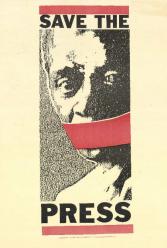 When the Press Freedom Commission released its report recommending changes to the regulation of the South African media on 13 April, it was considered by many to be a significant shift away from the current regulatory system.
When the Press Freedom Commission released its report recommending changes to the regulation of the South African media on 13 April, it was considered by many to be a significant shift away from the current regulatory system.
However, now that the storm has passed and experts have had an opportunity to consider the report more thoroughly, there appears to be a growing sentiment that the recommendations are not of the sweeping nature they originally appeared to be.
Speaking at a debate on press freedom hosted by the University of the Witwatersrand on 18 May, Dr Julie Reid, of University of South Africa, said that the commission's report was a "cleverly worded document, selling a system which is not remarkably different from the past".
The Press Freedom Commission, established by Print Media South Africa and the South African National Editors' Forum, consisted of nine people selected from outside the media community to consider the current regulation of print media.
Key recommendations of the commission are to:
• provide a system of independent co-regulation;
• introduce sanctions in the form of ‘space fines'; and
• to allow for third party complaints.
While much has been made of the ‘shift' from a system of self-regulation to co-regulation, whereby members of the press and public will constitute the Press Council, Reid argued it was not very different from the current system. Reid highlighted that the current system does not allow for self-regulation but rather the Press Council already consists of 6 members of the public as well as 6 members of the press. The Commission's recommendation is that this constitution would change to 7 members of the public and 5 members of the press, giving the public the upper hand. However, Reid pointed out that when adjudicating on complaints about the media the Press Council would still be constituted by an equal number of public and press members.
Reid also suggested that the much heralded ‘space fines' are not a new concept, but rather the sanction has just been given a new name. Space fines are a sanction that could be levied where a member of the print media was found to have contravened parts of the regulations, allowing the press ombud to declare where and how large a correction, apology or right of reply should be.
Equally Reid argued that the scope for third party complaints does not represent a radical shift away from current practice. While not officially provided for in the current code, Reid argued that third party complaints have previously been accepted by the Press Council and that many newspapers advertise within their publications for third party complaints. What is needed, suggested Reid, is a programme of public education to make people aware of the right to lodge a complaint.
While generally in agreement with Reid, William Bird, of Media Monitoring Africa, argued that one significant change to the code included in the commission's recommendation is the strengthening of the protection of children and their rights, dignity, privacy, image and interests. Bird argued that children were given extra protection in South African law and greater sensitivity and skill was required to report on them.
Bird stated "the press code put forward by the Press Freedom Commission is a huge step forward in ensuring greater protection for children in the media and at the same time encouraging media to hear children's voices."
Print Media South Africa, the South African National Editors' Forum and the Press Council must now review the recommendations in detail and decide on a way forward.
It is unclear at this stage whether the recommendations have gone far enough to dissuade the ANC from pursuing talk of a media appeals tribunal.





 When the
When the